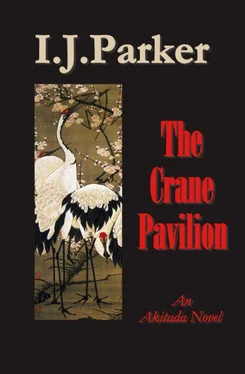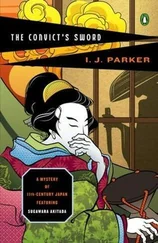I. Parker - The Crane Pavillion
Здесь есть возможность читать онлайн «I. Parker - The Crane Pavillion» весь текст электронной книги совершенно бесплатно (целиком полную версию без сокращений). В некоторых случаях можно слушать аудио, скачать через торрент в формате fb2 и присутствует краткое содержание. Жанр: Исторический детектив, на английском языке. Описание произведения, (предисловие) а так же отзывы посетителей доступны на портале библиотеки ЛибКат.
- Название:The Crane Pavillion
- Автор:
- Жанр:
- Год:неизвестен
- ISBN:нет данных
- Рейтинг книги:5 / 5. Голосов: 1
-
Избранное:Добавить в избранное
- Отзывы:
-
Ваша оценка:
- 100
- 1
- 2
- 3
- 4
- 5
The Crane Pavillion: краткое содержание, описание и аннотация
Предлагаем к чтению аннотацию, описание, краткое содержание или предисловие (зависит от того, что написал сам автор книги «The Crane Pavillion»). Если вы не нашли необходимую информацию о книге — напишите в комментариях, мы постараемся отыскать её.
The Crane Pavillion — читать онлайн бесплатно полную книгу (весь текст) целиком
Ниже представлен текст книги, разбитый по страницам. Система сохранения места последней прочитанной страницы, позволяет с удобством читать онлайн бесплатно книгу «The Crane Pavillion», без необходимости каждый раз заново искать на чём Вы остановились. Поставьте закладку, и сможете в любой момент перейти на страницу, на которой закончили чтение.
Интервал:
Закладка:
“No.”
“Well, do you know how she came to live here?”
“Considering your questions, you and your friends seem to know next to nothing about the lady. I don’t know any more, but I can guess. The answer is most likely that she was poor and alone in the world.”
“Surely the abbot knew her personally. I would think he knows you and his other lodgers. Why else would he offer these accommodations?”
“Ah. You think there is a story? Possibly a romance? True, the lady was quite beautiful, if my old eyes haven’t fooled me. I may be going on in years, but I do know female beauty.”
“Yes. Perhaps they knew each other before he took the tonsure. Did he ever visit her here?
“That I do not know. He comes here very rarely and doesn’t spend the night. As for his past, I didn’t know him then.”
“I see. Did you get to know her after she came to live here?”
“No. I’m past the age of paying visits to young women.” Suketada’s lip twitched. “Not sorry, you know. Women are trouble. I have my work to occupy me and, unlike you, I’m not curious about other people/s lives. We’d meet sometimes. Fetching water from the well or leaving or returning from an errand. She seemed very pleasant.”
“I see. What about the others who live here? Might they have been closer to her?”
“I wouldn’t be surprised. I keep my nose in my books all day and sleep at night, but I rather doubt the student studies much. At his age, he’s probably a night animal. The young are always roaming about. As for the nun, well, she’s another woman. The two of them probably had things to talk about.”
“How long have you lived here, sir?”
“Six years in another month. And don’t bother to ask how I came to accept charity or why it was offered, because I won’t tell you.”
Akitada acknowledged this with a small nod. “And Lady Ogata? How long has she been here?”
“She came a year later, I think. I couldn’t tell you exactly when. My memory’s going, and besides I wasn’t interested. One day I came across her in the garden. I asked her what she doing there, and she said she lived in the crane pavilion. Silly name. She meant the lake pavilion.”
“Did you not wonder at her being here?”
“Not at all. It’s none of my business.” Casting another glance at the malodorous food package, the professor added testily, “For that matter, what is your interest in her, Sugawara? I don’t believe you explained the real reason for your visit. Are you here in an official capacity?”
Akitada thought of the Ministry of Justice. He had probably already lost his position. On an impulse, he said, “I investigate crimes.”
The professor’s jaw dropped for a moment. Then he said in a tone of utter astonishment, “You think someone killed her?”
“The police believe it was suicide. Were you surprised when you were told of her death?”
After a pause, the professor said, “No.”
“Then you must have expected it. Were you aware of something being amiss, of an event or a fact that would have driven her to take her life?”
Professor Suketada looked away. “‘One cannot ask loneliness how and where it starts,’” he quoted, then glanced pointedly around his room. “You are a fortunate man, Sugawara. I had almost forgotten that there are people alive who do not find their lives a burden. No, I know of nothing that would have made her life harder to bear than mine.”
The darkness settled back on Akitada. Only hours ago, he had thought his own life an unbearable burden. He had done so for every hour of the past weeks and months since the news of Tamako’s death had reached him in that far-off place. He had railed against obligations which forced him to go on living, to return to an empty home, to take on the care of two young children and a house full of dependents. Was his grief so shallow that a mere tale of an unexplained suicide should have caused him to forget? No doubt, Lady Ogata could have had her own reasons for stepping off that trunk.
Slowly he got to his feet. “I’m sorry I troubled you, Professor. Please forgive the rude intrusion. Perhaps it is better not to ask too many questions. We may not like the answers.” He bowed. “Thank you for your candor.”
The professor nodded. His eyes had already moved to his dumpling.
His visitors left.
*
Outside again, Tora said eagerly, “What a weird fellow! If the rest are like him, we’ll find all sorts of mysteries here. What do you suppose would bring a learned man to live like beggar? The food he bought was rotten. I bet he begged for it.”
Akitada winced. “This is not a happy place. Far from having found a peaceful hermitage, the professor suffers hunger and spends his time contemplating his misfortune.”
“I think a man should keep active and go among other people. Sitting around in one small room, brooding over his misfortune, isn’t healthy. Maybe that’s what made the lady end her life.” He shot Akitada a sidelong glance.
“I thought you were convinced a crime had been committed. If you’ve changed your mind, perhaps we should return home now. I wouldn’t mind some peace and quiet in my room.”
Tora looked guilty. “Well, now that we’re here, let’s see what the others have to say first. Better get the job done properly or Secretary Nakatoshi will be disappointed.”
Akitada sighed, but he turned to look across the gardens. Seeing part of a tiled roof beyond the dense mass of trees, he said, “If I’m not mistaken that’s the lake pavilion over there. Let’s have a look at Lady Ogata’s quarters.”
5
The pavilion, for all its distance from the main house and its location in an untamed jungle of plants and vines, was a far more elegant abode than the professor’s room off one of the galleries. Akitada wondered what this might suggest for Lady Ogata’s importance or her closeness to the abbot. Tasuku was his own age, and the lady had been in her twenties. It was an age well past the time when women were courted, but she was younger than Tasuku. She could well have been his lover, for apparently she had been beautiful.
And what better place to stash away a lover than this hidden pavilion on his own estate? The abbot could visit any time he wished without exciting comment, yet hardly anyone would know about the woman waiting for him here.
Tora voiced the same thought. “Nice place for an occasional cuddle,” he said, grinning.
They climbed the steps to the door. Perhaps the interior would offer more clues to the lady’s character and her relationship to the saintly abbot.
When Akitada pushed open the door, he thought he heard a sound inside, but the room was empty when he stepped inside, Tora at his heels.
“She didn’t have much,” Tora commented, looking around at the bare floor and the two clothes chests pushed against one wall. There was also an empty clothes rack and a small bare writing desk.
Akitada said nothing. Tamako had owned four trunks for her clothing, one for each season of the year, and her pavilion had contained many more things for her comfort. Thick tatami mats had covered her floor, and there were cushions to sit on. For her enjoyment, she had had several finely painted screens, book cases filled with books, writing desks and utensils, scrolls of paintings and all the more useful items such as candle sticks, braziers both for heating the room and for heating water for tea, water containers, mirrors and cosmetics boxes and so forth. All of these comforts were lacking here. He wondered how Lady Ogata had eaten and where her meals had come from. Had she gone out like the professor to buy a small prepared meal from a stand or a peddler? Who had supported her? The abbot? Where were her servants? Had there been at least a maid?
Читать дальшеИнтервал:
Закладка:
Похожие книги на «The Crane Pavillion»
Представляем Вашему вниманию похожие книги на «The Crane Pavillion» списком для выбора. Мы отобрали схожую по названию и смыслу литературу в надежде предоставить читателям больше вариантов отыскать новые, интересные, ещё непрочитанные произведения.
Обсуждение, отзывы о книге «The Crane Pavillion» и просто собственные мнения читателей. Оставьте ваши комментарии, напишите, что Вы думаете о произведении, его смысле или главных героях. Укажите что конкретно понравилось, а что нет, и почему Вы так считаете.












